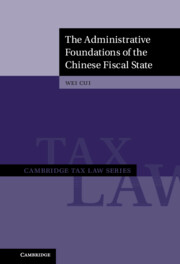Book contents
- The Administrative Foundations of the Chinese Fiscal State
- Cambridge Tax Law
- The Administrative Foundations of the Chinese Fiscal State
- Copyright page
- Dedication
- Contents
- Figures
- Tables
- Acknowledgments
- Abbreviations
- Introduction
- 1 The Forgotten Reform
- 2 What Is an Audit?
- 3 Atomistic Coercion
- 4 Returning Responsibilities to Taxpayers
- 5 Organizing Revenue
- 6 Policy Making without Information
- 7 The Rhetoric of Law
- 8 Varieties of State Capacity
- 9 Pivoting Away from the Rule of Law
- References
- Index
1 - The Forgotten Reform
Published online by Cambridge University Press: 24 March 2022
- The Administrative Foundations of the Chinese Fiscal State
- Cambridge Tax Law
- The Administrative Foundations of the Chinese Fiscal State
- Copyright page
- Dedication
- Contents
- Figures
- Tables
- Acknowledgments
- Abbreviations
- Introduction
- 1 The Forgotten Reform
- 2 What Is an Audit?
- 3 Atomistic Coercion
- 4 Returning Responsibilities to Taxpayers
- 5 Organizing Revenue
- 6 Policy Making without Information
- 7 The Rhetoric of Law
- 8 Varieties of State Capacity
- 9 Pivoting Away from the Rule of Law
- References
- Index
Summary
Chapter 1 tells the story of a forgotten reform, which was also among the most momentous policy initiatives in the history of Chinese taxation. The Chinese government began to build a tax administration workforce in the 1980s, during which time tax collectors practiced “nanny-style” administration: tax collectors handled most taxpayers’ compliance tasks. A major reform in 1994 introduced novel taxes, which required the wide adoption of taxpayer self-assessment. Reforming tax administration was thus necessary; tax administration reform began in earnest in 1997 and mobilized massive public and private resources. But it was interrupted by government restructuring and came to be challenged within tax agencies. By 2005, a regime largely modeled on the pre-1993 system was instituted, which gave priority to tax administrator initiatives over taxpayers’ in compliance. The 1997 reform was effectively abandoned. This unexpected survival of the pre-1994 tax administration approach defines the uniqueness of China’s modern fiscal state. The chapter considers two other institutions often taken as central to Chinese taxation – the separation of tax administration into two branches, and investments in information technology – and argues that their significance is ambiguous. Instead, a third feature of Chinese tax administration – extensive decentralization – represents a more important background.
Keywords
- Type
- Chapter
- Information
- Publisher: Cambridge University PressPrint publication year: 2022



